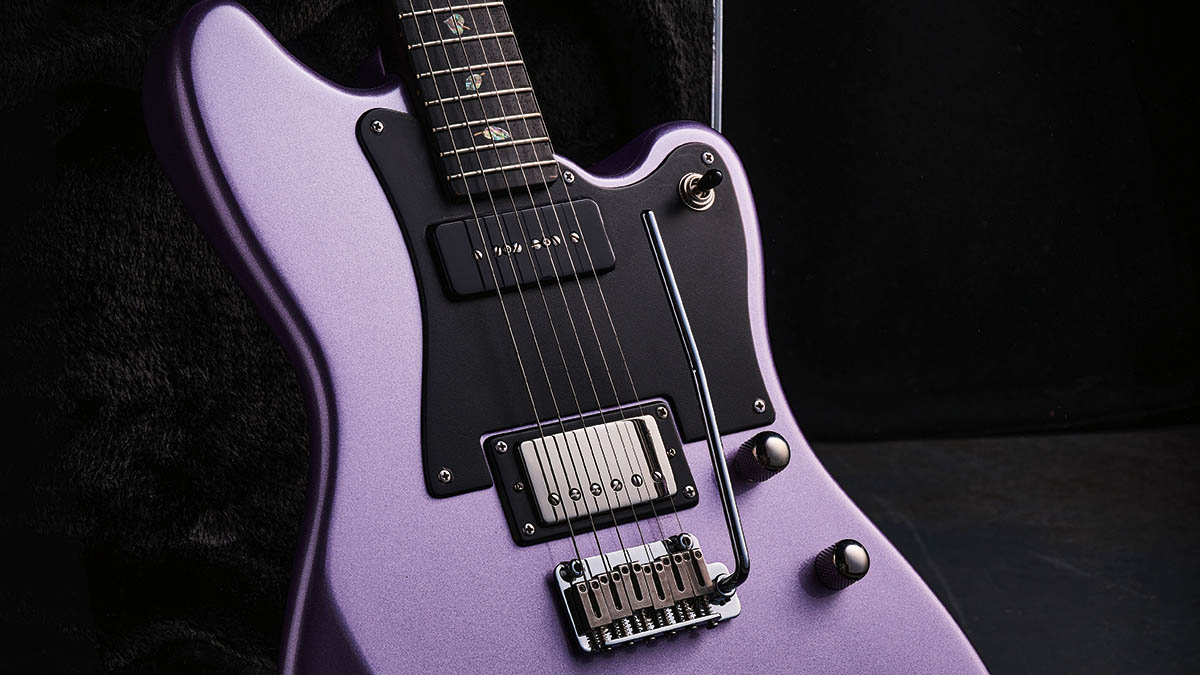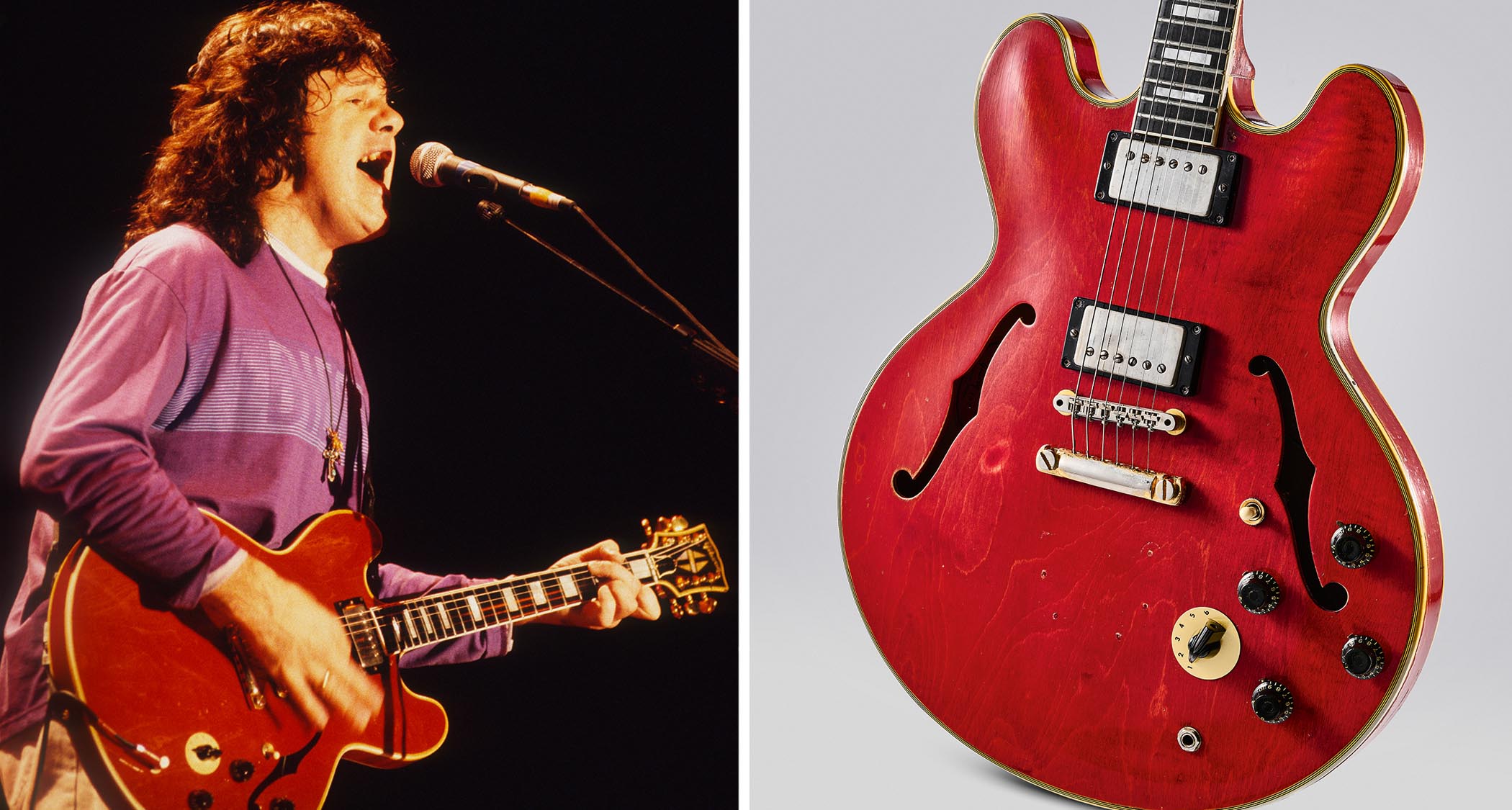Guitar World Verdict
It’s very hard to find fault: this is well considered, thoughtful guitar making and sensibly priced to boot. It’s a modern take on the offset with a great weight.
Pros
- +
Superb modern offset design.
- +
Good weight.
- +
Excellent playability and neck.
- +
Rock‑ready voicing.
- +
Excellent hardware.
Cons
- -
High E bridge saddle is too close to mounting post.
You can trust Guitar World
Headed by Neil Haynes in Banbury, Oxfordshire, UK, Haynes Guitars is an extension of the long-running Guitar & Bass Builds, which makes necks, bodies and pickups, that Neil established in 2012 after his previous life as a cabinet maker.
“I’ve been building guitars for about 30 years, since I was 21,” reflects Neil today. Work started on the new range around two years ago, and with the S-style Inflection, T-inspired Fidelity and the new SC22 (a 22-fret single-cut), our Demeanour offset guitar makes up a pretty impressive four-model range.
These might use shapes based on those we’ve seen countless times before, but the Haynes menu includes a seven-strong choice of metallic colours – along with other limited-run hues such as our Ultraviolet.
“I use a modern polyurethane on the body,” says Neil. “It’s really thin and very different from what I was using back in the day; it’s faster to apply, too. The neck is an acid-catalysed lacquer, which we call a modern cellulose finish.”
The necks across all the Haynes models are one-piece mahogany and have dual graphite rod reinforcement – which is a big change from the ubiquitous maple.
“I always liked Gibson’s necks and like to fade the finish from a lighter neck back into a darker headstock,” says Neil.
“That doesn’t work so well over maple. So, yes, there are tonal considerations, but I like the wood, it stains really well and it’s readily available here in the UK. And it’s a bit different; it’s mixing up the styles a bit. Also, we’ve just launched our first glued-in‑neck guitar and I never think maple on that style looks right.”
All the latest guitar news, interviews, lessons, reviews, deals and more, direct to your inbox!
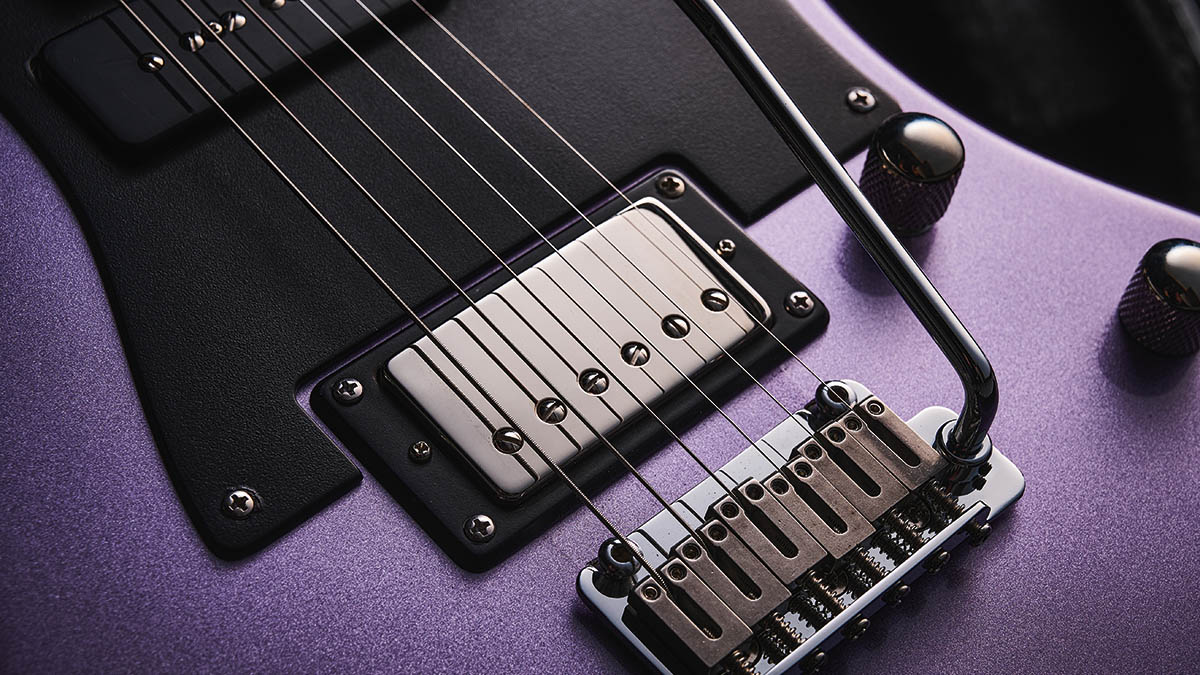
An opaque finish hides the American alder body, which is not only chambered (the cavities are small ‘pockets’ as opposed to being large chambers) but also shows off a larger forearm chamfer and deep vintage-like ribcage contouring. The heel is heavily contoured, too.
There’s a lot of detail here, not least the aluminium back and neckplates, the scratchplate in an aged ‘black Japan’ finish, and the brushed aluminium truss rod cover that’s recessed slightly below the headstock face, which bears the instrument name.
Then there are the ‘falling leaf’ fingerboard inlays that certainly give these Haynes guitars a different visual. The fingerboard here is ebony and has a pretty modern compound radius, while the top edges are pretty heavily rolled; from the side the ’board looks scalloped yet it isn’t. The Jescar frets are very well installed – the tangs are notched before installation, so you don’t see then from the fingerboard sides.
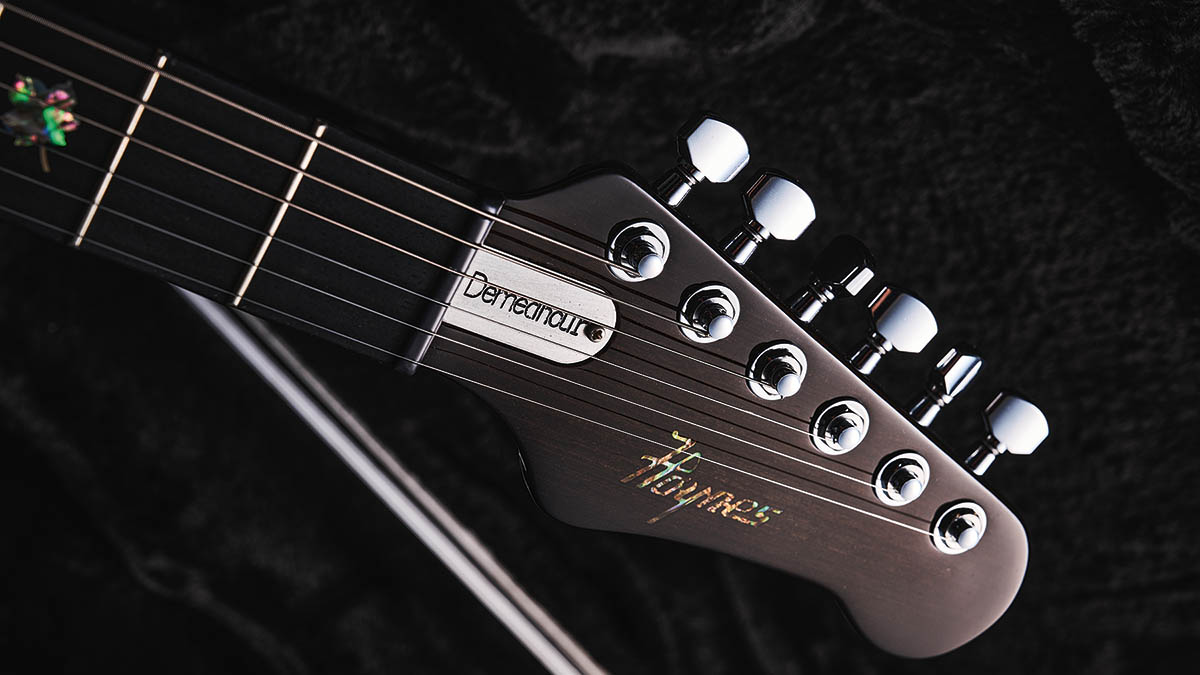
Overall, it’s a stylish design topped with a classy six-in-a-line back-angled headstock, with Gotoh tuners that have dual-height posts so string trees aren’t necessary.
The NS510T-FE1 vibrato also comes from Gotoh’s high-quality stable and uses all-steel construction with a tension-adjustable arm. It floats parallel to the body, so there’s just under a semitone up-bend on the high E and around six semitones down-bend on the G. And like an increasing number of UK makers, the pickups across the range are wound in-house. Let’s take it for a spin…
Feel & Sounds
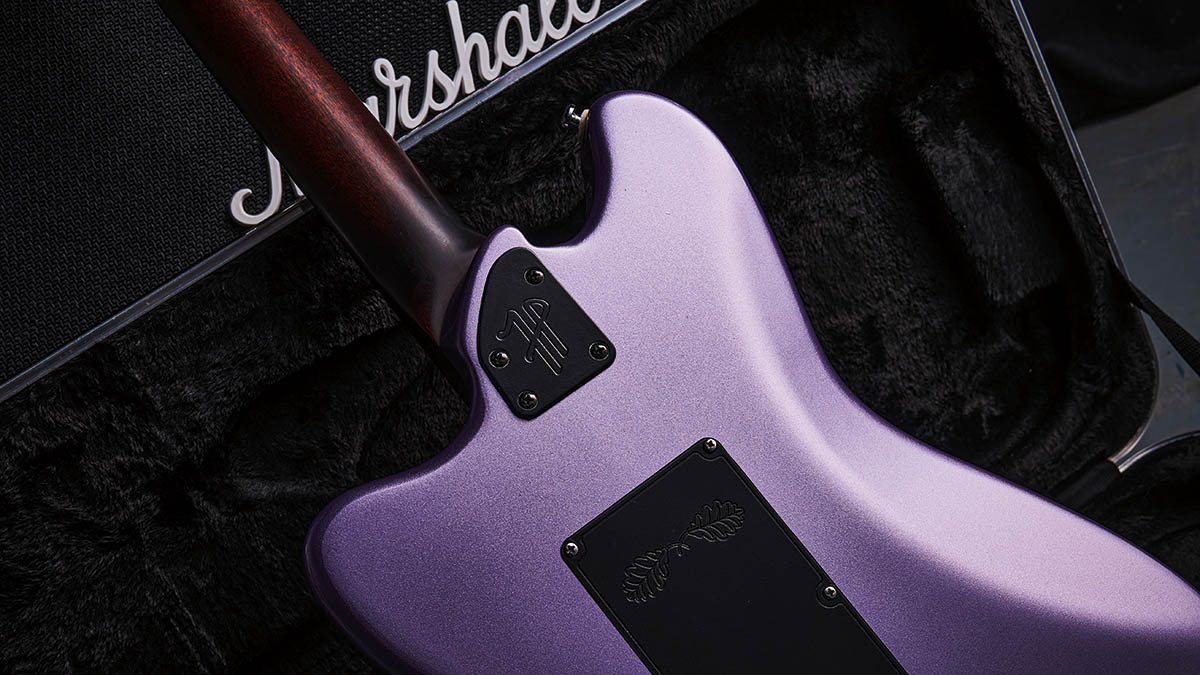
The wood choice and chambering certainly produce a good weight for an offset such as this, which can be heavy, as many will know. The neck feels really good, with a matt feel to the back; it’s much smoother than many bare or oiled necks we’ve had through our hands.
Its profile is well considered, a not-too-skinny or over-big C with quite relaxed shoulders, a nut width of just over 42mm, and a depth at the 1st fret of pretty much 21mm and 24mm by the 12th. The heavy edge-rolling seems to make the fingerboard radius feel less ‘flat’ than it actually is, and setup as supplied is very good.
However, the top E bridge saddle looks rather too close to the large domed vibrato post, and maybe a little more neck back angle would mean the saddles were raised a little. But, as is, we have no complaints: there’s nothing here that gets in the way of playing, especially those well-polished frets.
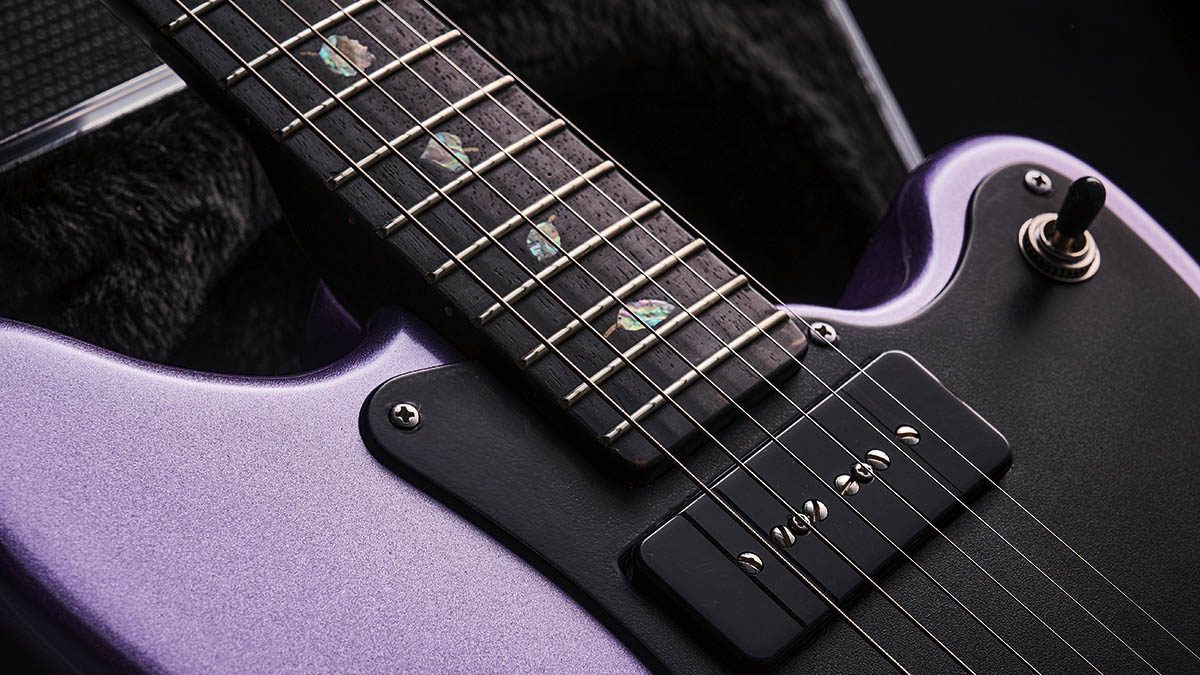
While Haynes has pushed the boat out in numerous aspects of this design, the master volume, tone and three-way toggle pickup selector mean it’s a simple drive. And although the Demeanour’s outline is based on the trendy Fender offset, it certainly doesn’t sound like one.
No, this ticks a much rockier box: the bridge humbucker kicks nicely with a juicy, slightly cocked-wah voice that laps up gain, the mix offers pretty full-sounding jangle, and the neck soapbar is well matched in output, creamier but with a little edge, and played clean, it can certainly cover any jazzier duties, too.
But with the pull-switch on, unusually the volume control works really well to split the bridge pickup, giving a pretty gutsy and well-voiced single coil that produces strident jangle through to alt-rock strummage with some fuzzier gain. It mixes really well with that P-90 and really broadens the voices on offer. A big-sounding guitar with considerable versatility.
Verdict
It’s very hard to find fault: this is well considered, thoughtful guitar making and sensibly priced to boot. It’s a modern take on the offset with a great weight, but the oh-so-classic-feeling neck, not to mention the simplified drive, create a juicy, rock-ready offset, with subtlety if you need it, that we’d take on a gig without a thought.
It’s impressive craft at every level – we really are in a golden age for UK guitar making.
Specs
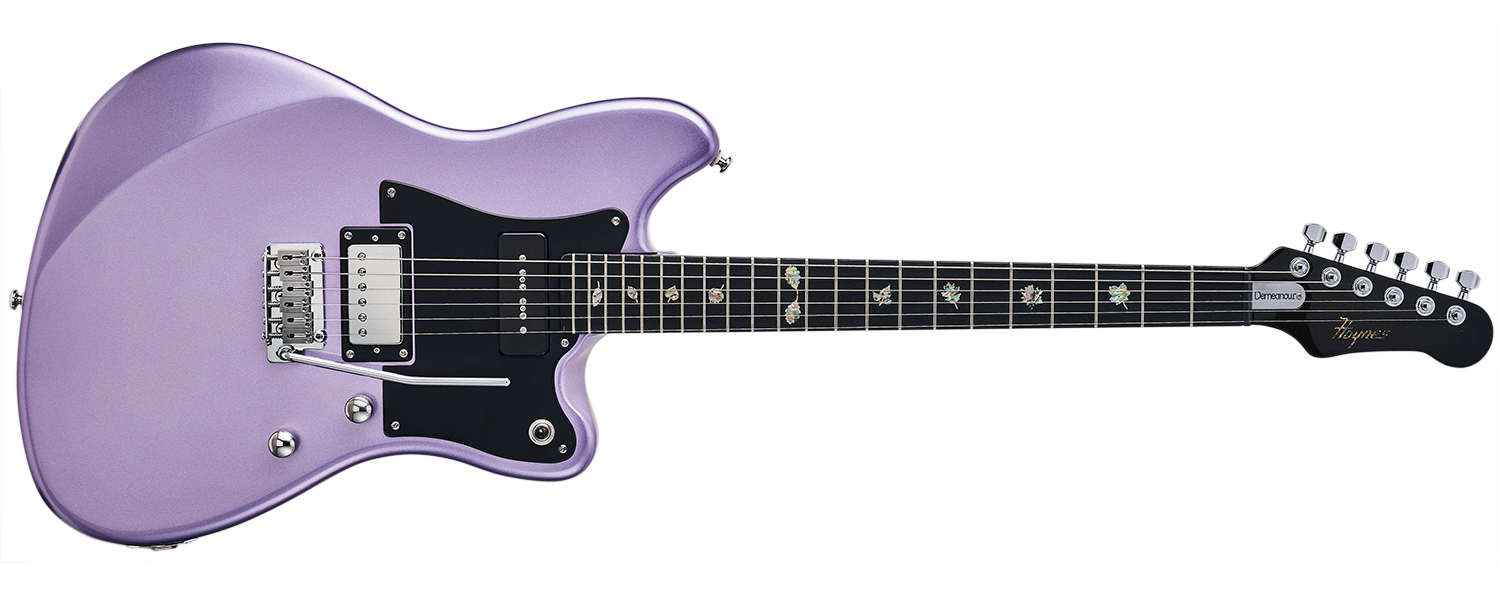
- PRICE: £2,600 ($3,299 approx, inc hardcase)
- ORIGIN: UK
- TYPE: Double-cutaway offset solidbody electric
- BODY: American alder (chambered)
- NECK: African Mahogany with two carbon fibre rods, standard ‘comfort C’ profile, bolt-on
- SCALE LENGTH: 648mm (25.5”)
- NUT/WIDTH: Graph Tech/42.3mm
- FINGERBOARD: African ebony, ‘falling leaf’ epoxy/abalone inlays, 229-356mm (9-14”) compound radius
- FRETS: 22, medium (Jescar 2.28 x 1.4mm)
- HARDWARE: Gotoh NS510T-FE1 vibrato, Gotoh SG381 dual height locking tuners
- STRING SPACING, BRIDGE: 54mm
- ELECTRICS: Haynes P-90 (neck), Haynes humbucker (bridge), 3-way toggle pickup selector switch, master volume and tone
- WEIGHT (kg/lb): 3.59/7.9
- OPTIONS: Pickup configuration, custom colours. Just ask!
- RANGE OPTIONS: The start-up range includes the T-style Fidelity and S-style Inflection (both £2,600) and the set-neck SC22 single-cut (£2,995)
- LEFT-HANDERS: Yes, same price
- FINISHES: Ultraviolet (as reviewed) plus standard British Racing Green, Burnt Orange, Opal Blue, Electric Blue, Smoke Grey, Midnight Purple, Charcoal Black, Blood Red metallics – thin modern polyurethane body; modern cellulose glossed headstock, matt neck back
- CONTACT: Haynes Guitars

Dave Burrluck is one of the world’s most experienced guitar journalists, who started writing back in the '80s for International Musician and Recording World, co-founded The Guitar Magazine and has been the Gear Reviews Editor of Guitarist magazine for the past two decades. Along the way, Dave has been the sole author of The PRS Guitar Book and The Player's Guide to Guitar Maintenance as well as contributing to numerous other books on the electric guitar. Dave is an active gigging and recording musician and still finds time to make, repair and mod guitars, not least for Guitarist’s The Mod Squad.
